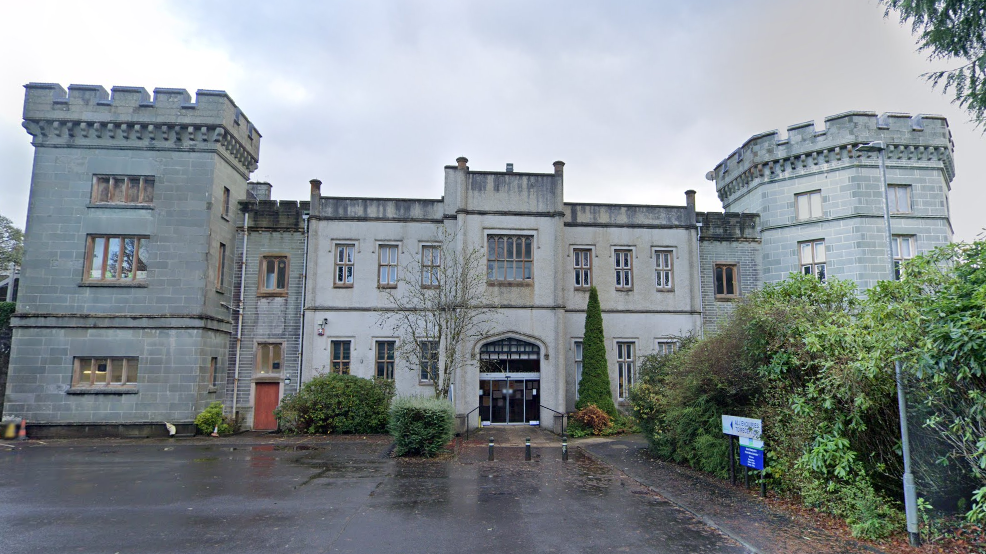Argyll and Bute votes to raise council tax by 10%

Argyll and Bute council headquarters at Kilmory Castle
- Published
Argyll and Bute Council has voted to raise council tax by 10%, becoming the first council to reject the Scottish government's council tax freeze.
Councillors voted for the rise in an attempt to overcome a £40m funding gap.
This means Band D properties in the region will now pay £1,627.12.
Other local authorities including Aberdeenshire have voted to implement the freeze announced by the first minister in October.
Glasgow, the Western Isles, the Scottish Borders, North Lanarkshire and South Lanarkshire have also implemented the freeze.
Councillors in Argyll and Bute were told they had to consider whether to reject the freeze and increase council tax by a minimum of 6.15% or a "one-off fix" of using reserves to balance the budget.
The 10% rise came as a surprise to some councillors.
The Liberal Democrat leader of Argyll and Bute council, Robin Currie said he did not want to raise council tax by 10% but the council had "no option" if it wanted to save services and jobs.
South Lanarkshire Council votes to freeze tax
- Published21 February 2024
Council tax freeze agreed in Western Isles
- Published21 February 2024
Councils vote to freeze tax rates
- Published15 February 2024
Scottish Borders Council agrees tax freeze
- Published21 February 2024
During the meeting councillors were told that Deputy First Minister Shona Robison had written to councils on Wednesday offering them an extra £62.7m in funding if they voted to implement the freeze.
Mr Currie said it was “heartening” that the government had offered extra funding "at the eleventh hour” but a lack of clarity remained.
He added: “It is impossible for it to make any real difference to budgets at this stage.
“Regardless of the additional money we are still in a very difficult position but we are not alone.
“Claims about a fully-funded freeze are no more than just that.”
Mr Currie added that the government had placed an “all or nothing” demand on already “cash-strapped councils”.
The council's strategic opposition group, made up of SNP, independent and one Labour councillor had wanted to bring in the freeze to help constituents during the cost of living crisis.
What is the debate over Council tax?
The Scottish government had previously proposed raising council tax rates by as much as 22.5% for homes in higher bands.
But Humza Yousaf said they would remain at current levels when councils set their budgets for 2024-25. He said this was the SNP “delivering for people when they need it most".
Council funding is complex. The council tax generates about 13% of local government funding, with most of the rest of their cash coming from Holyrood.
The levy has either been frozen or capped at 3% since the SNP came to power in 2007, with the Scottish government providing local authorities with extra funding in return.
But councils have been allowed to use new powers to set their own rates for the past two years, with most areas seeing rises of between 4% and 7% this year.
Mr Yousaf has said the government would make up the budgetary shortfall for councils who would have raised taxes, with £144m made available to local authorities.
Cosla, the umbrella body for councils in Scotland, said that the freeze was not being fully funded by the government.

Argyll and Bute's decision to raise council tax is not just a matter of local interest. It has wider significance.
It means the Scottish government has been unable to deliver another national council tax freeze.
The unexpected announcement of a freeze by the First Minister at the SNP conference took councils by surprise.
Councils made the point the government could not freeze council tax - it was for individual councils to agree that decision.
In practice though, the Scottish Government had delivered several national freezes since 2007 through a combination of carrots and sticks.
This year that approach failed.
It should be stressed that several other councils have confirmed a freeze. Some say they are unhappy about it but felt they had no realistic alternative.
One question now is whether some other councils may also opt for an increase. Inverclyde will discuss this option next week.
But the fact that even one council has rejected the freeze is likely to be exploited by the first minister's political opponents.